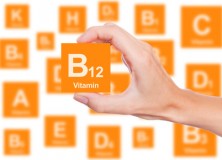Surprised to see a post about vitamin B12 on an iron deficiency blog? Don’t be! Vitamin B12 actually has quite a lot to do with your blood and iron levels and I’m going to explain just what the relationship is in plain English without all the medical jargon and mumbo jumbo you might find in health articles.
B12 101
Let’s get down to it with a quick rundown of the basics of vitamin B12.
B12 is a water-soluble vitamin that can be found in much of what we eat, with the highest amounts being found in red meat, poultry, eggs, milk, and fortified cereal and bread. Because it is water-soluble, your body doesn’t store it in large amounts, so getting it onto your daily diet is a must.
So, What Does it Have to Do With Your Blood?
Vitamin B12 plays an important role in the formation of hemoglobin. To refresh your memory; hemoglobin is a key protein in red blood cells, whose function is to carry oxygen from your lungs to your body’s other organs and tissues. Without enough vitamin B12 your body can’t make functional red blood cells that are able to do their job.
Not getting enough vitamin B12, either because of diet or due to other medical conditions that interfere with the body’s ability to absorb the vitamin properly can lead to a type of anemia called “macrocytic anemia”, also known as “vitamin B12 deficiency anemia”.
The symptoms and signs of B12 deficiency anemia include:
- Red and swollen tongue;
- Bleeding gums;
- Loss of appetite;
- Pale skin;
- Diarrhea.
What You Can Do About It?
Preventing a vitamin B12 deficiency begins with eating foods rich in B12. The National Institutes of Health recommend the following amounts of B12 each day:
| Teens and Adults Aged 14 and Older | 2.4 mcg (micrograms) |
| Pregnant Women | 2.6 mcg (micrograms) |
| Breastfeeding Women | 2.8 mcg (micrograms) |
You can also supplement B12 with an oral supplement or with monthly B12 injections depending on the extent of your deficiency. If your deficiency is caused by a medical condition such as celiac disease, Crohn’s, or alcoholism, addressing the cause will usually resolve the deficiency. Speak to your doctor right away if you’re experiencing any symptoms of vitamin B12 deficiency anemia and before starting a new supplement.
Content and advice provided on The Iron Maiden is for information purposes only and should not serve as a substitute for a licensed health care provider, who is knowledgeable about an individual’s unique health care needs



What about when you get too much B12?
Hi Yvonne,
Some literature suggests that too much B12 can lead to a phenomena known as “B12 Syndrome”. It is traditionally thought that too much B12 is not much of an issue because it is a water-soluble vitamin. In some cases, however, this is not true.
If we use the analogy that iron is the bricks of a healthy normal blood supply and haemoglobin is a brick wall, B12 is the stone mason. B12 helps with the conversion of iron to haemoglobin (or builds the brick walls). If your B12 is too high, all the oral iron you take gets converted to haemoglobin and dose not get stored in your bone marrow or liver. Extremely high B12 levels may actually utilize stored iron. The result, then, is a higher than normal haemoglobin and depleted iron stores, which may result in difficulty getting treatment for Stage I and/or Stage II iron deficiency, as most health care providers do not even consider treating iron deficiency until you are anemic (stage three or end stage iron deficient).
I often suggest that clients who receive B12 injections increase their oral iron supplements by one dose for at least one week to give the increase in B12 something to build haemoglobin with.
I would like to take this opportunity to state that some literature suggests that in the absence of extreme GERD (Gastro Esophageal Reflux Disease), which is defined as taking maximum dose of “proton pump” and/or “H2” inhibitors and still requiring antacids, sublingual B12 is as effective as B12 injections. In fact, some may consider it to be better as there is a more of a steady blood level with sublingual than the peaks and valleys common with B12 by injection.
Leona